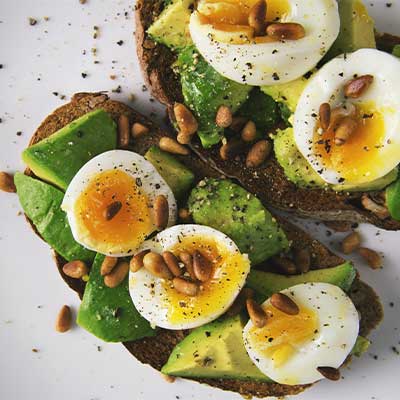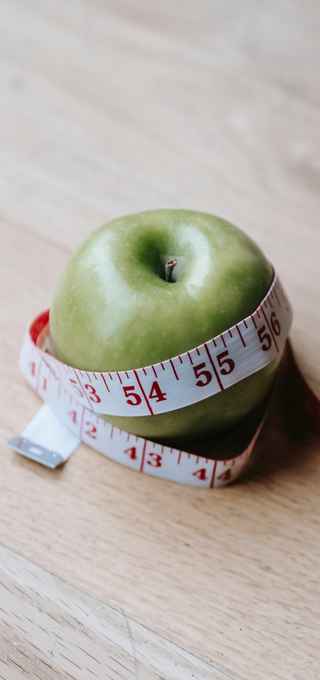Last Updated on July 31, 2024 by Nicole
Trying to get in shape, lose weight, or just eat better? Perhaps you’ve tried every diet under the sun – with perhaps the exception of one. There are several recognized benefits to plant based diet weight loss, including weight loss. It’s not only backed by science and shown to work, but it also lets you eat twice as much food with half the calories. Even better, you don’t have to count calories or measure portions.
So what’s the secret behind this magical diet? Plants! Weight loss can be a complete cinch with a plant-based diet.
Below you’ll learn how shifting to a plant-based diet can help you stay healthy or lose weight. Your health will improve because it’s not just the weight you’re losing – you’ll also eliminate the animal fat and highly processed foods that can adversely affect health, weight, and mood by replacing them with health-promoting, nutrient-rich whole plant foods.
What is a whole food, plant-based diet?
To start with, a plant-based diet focuses on whole foods that come from plants instead of the processed and animal-based foods that make up the majority of Americans’ diets. Unfortunately, Americans currently eat a whopping 70 percent of their calories from ultra-processed or processed foods and 36 percent of their calories from animal foods [1]. As if that’s not bad enough, only one in 10 Americans is eating enough fruits and vegetables [2] – a recipe for disaster. Experts have coined this the “standard American diet” or SAD for short.
But there is hope! In his book Food Rules, journalist and author Michael Pollan offers some simple strategies for eating healthier. One of them explains a whole food, plant-based diet in two sentences:
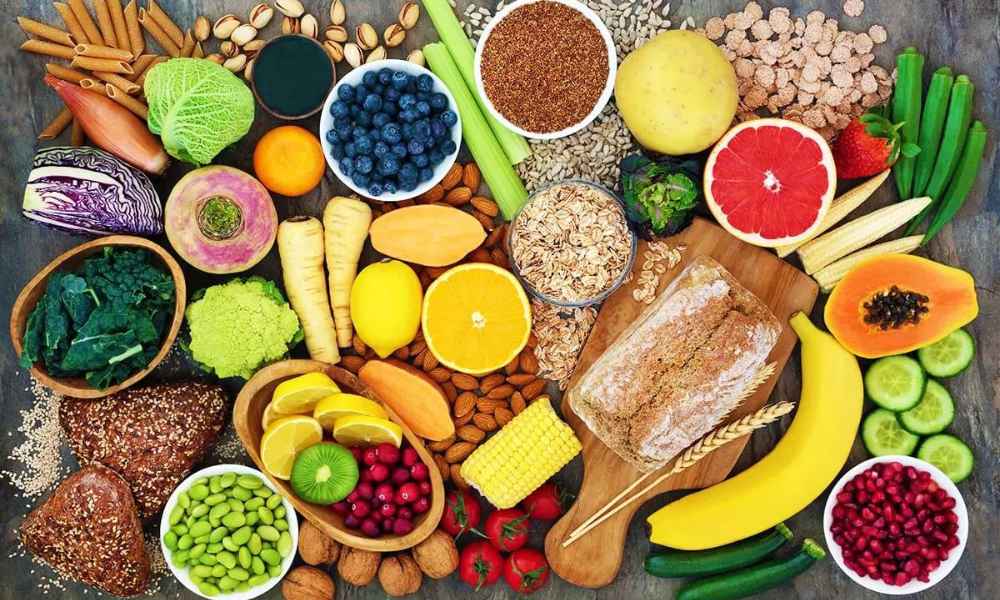
“If it’s a plant, eat it. If it was made in a plant, don’t.”
The key to a plant-based diet is healthy, whole foods. Here are some of the key components:
- Emphasizing whole, minimally processed foods.
This might sound hard, but it’s no harder than eating SAD. You probably still take time to shop, prepare, and cook. The one difficulty? It might take your tastebuds a little time to adjust because they’re used to eating unhealthy foods that are loaded with fat, sugar, and salt. Give it time – many plant-based docs recommend a few weeks, with nutrition researcher Dr. Michael Greger suggesting at least three weeks [3] – and the more plants you eat, the better they’ll taste.
Download our free ebook for bonus content, recipes, and more on losing weight with a plant-based diet.
Why it’s not the same as a vegan diet?
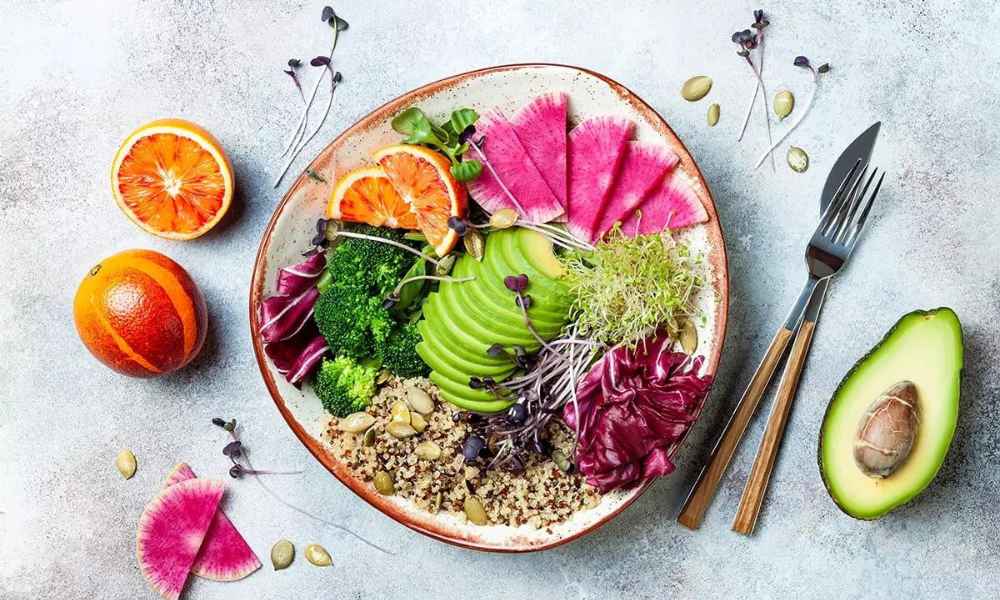
Eating plant-based is often confused with a vegan diet. While they have similarities, there are subtle differences between the two.
Vegans often eschew all animal products. Whether via the food they eat, the clothes and shoes they wear, the products they buy for their home or office, or the companies they support, many vegans don’t eat or use anything with animals. Yet just because something is vegan doesn’t always mean it’s healthy.
The rise of veganism has flooded grocery store shelves with a lot of vegan junk food. While there are no animal products in these foods, they’re often still refined and processed, and surprisingly, that can also lead to health issues.
Meanwhile, somebody who’s eating a 100 percent whole food, plant-based diet eliminates not only animal products but also highly refined and processed foods. They might best be described as plant-only eaters.
After all, it’s possible that you could be plant-based and eat only 60 or 80 percent of your diet from plants. While you’ll still get some health benefits doing this, you’ll see the best results – and the most effective weight loss – if you move to a plant-only diet [4]. If you do this, you may never have to struggle with weight gain. And as a bonus, data indicates that eating more plants and less meat can also help you save money in the long run [5].
How can a plant-based diet help me lose weight?
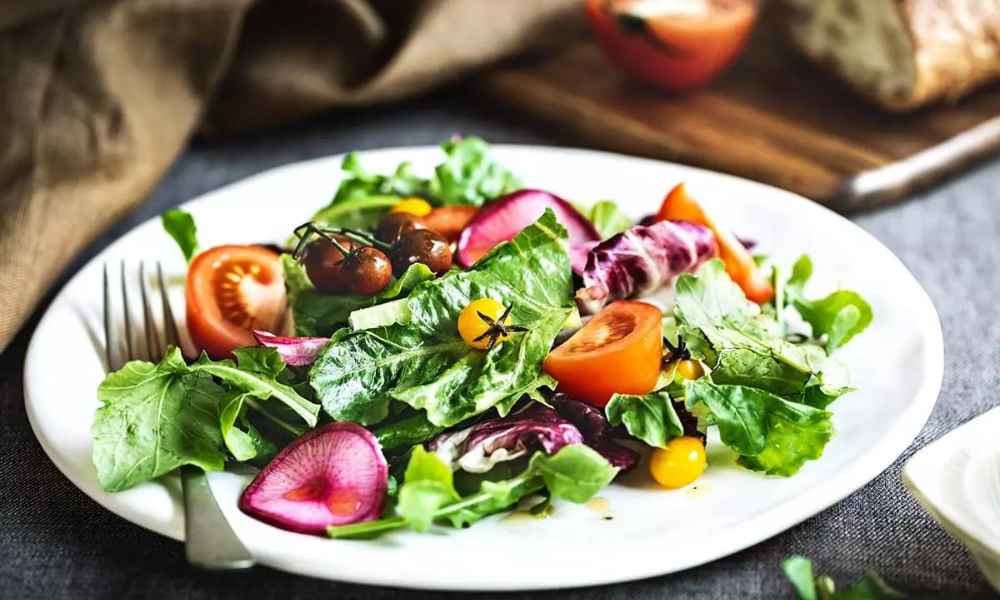
The answer can be summed up in two words: calorie density. Never heard of it? Here’s what it is and why it’s key for weight loss.
Calorie density means the number of calories in a pound of food; it’s the reason you can eat more on a plant-only diet and still slim down. Research shows that people eat the same volume of food every day – generally between three and five pounds [6]. By choosing foods that are low in calories but high in volume, you can not only eat more but also feel fuller on fewer calories. So what are the most filling foods on earth? You guessed it: plants [7].
Plants contain high amounts of fiber and water, and that combination makes you feel fuller on fewer calories a day. Water, after all, adds weight without adding calories to the food, which is why you’re able to eat more and still lose weight. That’s also why science consistently shows that vegetarians and vegans have a healthier body weight and body mass index than their meat-eating peers [8].
Note, though, that you can only get fiber from plants, and you need fiber for so many reasons. These include helping you keep a normal weight, lowering your cholesterol, and even living longer [9]. The trouble is that most Americans fall short of their fiber intake. Research indicates that most Americans are eating only 15 grams a day, while adult women need at least 25 grams per day and adult men need 38 grams [10].
Although you won’t be counting calories or measuring portions with calorie density, it does help to know the weight and volume of certain foods so you know how to structure your meals. Here’s a calorie density scale from forksoverknives.com [11]:
Calorie Density Scale
Foods Calories/Pound
- Vegetables = 60-195
- Fruit = 140-420
- Potatoes, pasta, rice barley, yams, corn, hot cereals = 320-630
- Beans, peas, lentils (cooked) = 310-780
- Bread/bagels, fat-free muffins, dried fruits = 920-1360
- Sugars = 1,200-1,800
- Dry cereals, baked chips, fat-free crackers, pretzels, popcorn = 1,480-1,760
- Nuts/seeds = 2,400-3,200
- Oils = 4,000
Many people can avoid weight gain or perhaps even lose weight (depending on their activity levels) by sticking with foods that are under 800 calories per pound [12]. Yet as soon as you start eating foods with more than 800 calories per pound, you may stop losing weight and will most likely gain weight, according to the University of California Davis Integrative Medicine [13, 14].
Too confusing? Keep it simple by following this rule from a plant-based chef, author, and weight loss expert Chef AJ: if you want to guarantee weight loss, load at least half your plate at every meal (even breakfast) with vegetables [15].
Simple steps to transitioning to a plant-based diet weight loss

Changing what you’ve been eating since day one isn’t easy. While some people can make the switch overnight, the majority take longer. And that’s okay. Any step you take toward eating more plants is a step toward shedding that weight for good (and keeping it off) along with getting healthier overall.
If you’re not ready to commit to a plant-only diet, here are six small steps to help you make the transition. Any one of them can be a good starting point. As you master one, move to another.
Plant Based Diet Weight Loss Transitioning Steps
- Ditch the dairy: Now that there are so many non-dairy milk, cheeses, yogurts, and ice creams on the market, it’s easier than ever to go dairy-free. Many plant-based docs recommend this as a first step since numerous studies show that dairy can potentially be dangerous to health. Use non-dairy products the same way you use traditional dairy. For instance, pour non-dairy milk on your cereal or make a smoothie with non-dairy yogurt.
- Adopt the Meatless Monday habit: Commit to eating meatless just one day a week via this global campaign, and you may find that you feel so good doing one day that you want to keep adding more.
- Break the fast with plants: Breakfast is probably the easiest meal to make plant-based, which is why it’s often a good starting point.
- Follow the One-Meal-A-Day diet: This is a movement (with its own book) created by Suzy Cameron, wife of film director James Cameron, who advocates swapping at least one meal a day with plant-based foods.
- Make your favorite meals plant-based: You can make any dish plant-based these days, including pizza, lasagna, or macaroni and cheese. So think about the meals you make most often and look at how you can replace any animal products with plant-based foods. Come up with about five staple recipes that you can do this with and just rotate through them and add more as you get more adventurous.
- Swap beef for beans: Got a recipe that calls for beef? Beans are an easy switch, as you can use them for burgers, tacos, soups and stews, meatloaf, and so many other dishes. As a bonus, according to research by the Blue Zones, the healthiest, longest-living people in the world eat beans daily [16].
So is a plant-based diet for you? Besides the most commonly understood health benefits, including weight loss, a plant-based diet can also provide a ton of additional benefits to both your body and the environment. For a complete list of these (and some awesome bonus content, including 4 super easy, DIY plant-based recipes), download our e-book below!
Top 10 Best Snacks for Weight Loss and Energy Gain
Eating balanced snacks between meals…
Weight Loss Detox Demystified: Do Detox Drinks Really Work?
With the holiday season still…
9 Healthy Postpartum Diet Tips for Post-Pregnancy Weight Loss
Having a baby and becoming…
How to Achieve a Plant Based Diet Weight Loss 2024
Trying to get in shape,…
- 9 Healthy Postpartum Diet Tips for Post-Pregnancy Weight Loss
- 6 Tips On How to Lose Weight While Still Drinking Alcohol
- Top 10 Best Snacks for Weight Loss and Energy Gain
- Weight Loss Detox Demystified: Do Detox Drinks Really Work?
How much weight can you lose in a week on a plant-based diet?
2-3 pounds per week
If you follow a whole food plant-based (or vegan) diet, you can lose up to 2 to 3 pounds every week and keep them off. Visit the Vegan Food Pyramid to learn what foods are “on the list” and how much is advised for each.
How much weight can you lose in 3 months on a plant-based diet?
According to Dutch researchers, adopting a plant-based diet for three months can help overweight persons lose an average of 16 pounds. They blame the outcomes on a diet that excludes calorie-dense cheese and red meat.
How much weight can I lose in 2 weeks on a plant-based diet?
Results after 2 Weeks: You’ll lose weight, especially if you cut out sugar. According to studies by the Physicians Committee for Responsible Medicine (PCRM), moving to a whole-food, plant-based diet results in an average weight loss of around a pound per week.
References
- BMJ Open, 2017, “Consumption of ultra-processed foods and associated sociodemographic factors in the USA between 2007 and 2012,” https://bmjopen.bmj.com/content/bmjopen/8/3/e020574.full.pdf
- Centers for Disease Control and Prevention, November 16, 2017, “Only 1 in 10 adults get enough fruits or vegetables,” https://www.cdc.gov/media/releases/2017/p1116-fruit-vegetable-consumption.html
- NutritionFacts.org, “Want to be healthier? Change your taste buds,” https://nutritionfacts.org/2014/06/24/want-to-be-healthier-change-your-taste-buds/
- International Journal of Disease Reversal and Prevention,” The Use of Plant-Based Diets for Obesity Treatment,” https://ijdrp.org/index.php/ijdrp/article/view/11/27
- UC Davis Integrative Medicine, “Cheap or Expensive? The REAL Truth about Plant-Based Diets,”
- UCDavis Integrative Medicine, “Why you should stop counting calories,”
- UCDavis Integrative Medicine, “Why you should stop counting calories,”
- International Journal of Disease Reversal and Prevention, “The Use of Plant-Based Diets for Obesity Treatment,” https://ijdrp.org/index.php/ijdrp/article/view/11/27
- American Journal of Epidemiology, 2015, “Association between dietary fiber and lower risk of all-cause mortality,” https://www.ncbi.nlm.nih.gov/pubmed/25552267
- Journal of the American Dietetic Association, “Position of the American Dietetic Association: health implications of dietary fiber,” https://www.ncbi.nlm.nih.gov/pubmed/18953766
- Forks Over Knives, www.forksoverknives.com/the-calorie-density-approach-to-nutrition-and-lifelong-weight-management/#gs.a88fub
- Forks Over Knives, “The Calories Density Approach to Nutrition and Lifelong Weight Management,” www.forksoverknives.com/the-calorie-density-approach-to-nutrition-and-lifelong-weight-management/#gs.a88fub
- Forks Over Knives, June 19, 2012, “The Calorie Density Approach to Nutrition and Lifelong Weight Management,” https://www.forksoverknives.com/the-calorie-density-approach-to-nutrition-and-lifelong-weight-management/#gs.a88fub
- UC Davis Integrative Medicine, “Why You Should Stop Counting Calories,”
- Forks Over Knives, July 9, 2018, “Chef AJ shares her secrets for healthy, plant-based weight loss,” https://www.forksoverknives.com/chef-aj-shares-her-secrets-for-healthy-plant-based-weight-loss/#gs.a87iqc
- Blue Zones, “Food guidelines,” https://www.bluezones.com/2015/07/blue-zones-food-guidelines/
